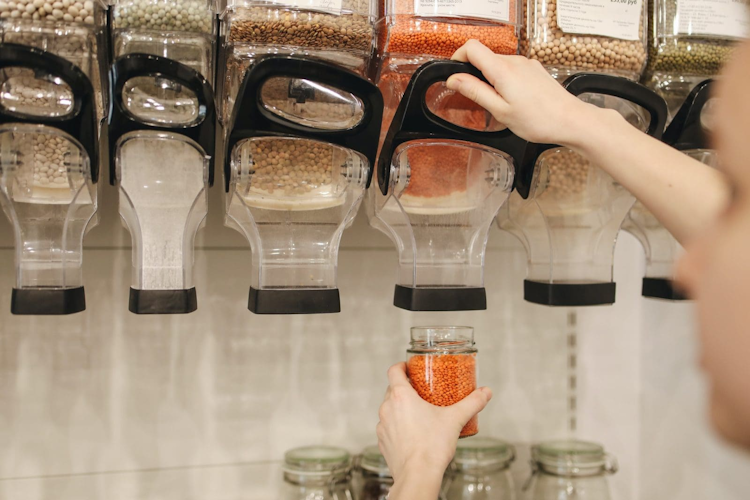The zero waste approach
Zero waste is an approach to reduce our impact on the environment, by reducing the quantity of waste we produce and its negative impacts on the planet. We also talk about a zero waste approach.
Zero waste is a progressive and positive approach that we can follow individually and collectively. It allows you to save money, promote products that are better for your health, and limit your negative impact on the environment.
Really zero waste
No, obviously! Zero is an ideal objective, it is the horizon that we give ourselves: a society that respects the environment, with a minimum of waste and waste, and a truly circular economy. This is reflected in the zero waste motto: the best waste is the one we don’t produce.
The objective is not to have recyclable or biodegradable waste: it is to avoid having waste altogether whenever possible, and to favor durable, reusable, repairable objects.
How to do it: the 5R rule
The zero waste approach allows us to rethink our way of consuming:
- reduce waste at source
- extend the lifespan of objects
- best treat the waste produced
To do this, we rely on the famous 5R rule, created by Béa Johnson: Refuse, Reduce, Reuse, Return to the Earth and Recycle
The 5R rule:
- Refuse: things you don’t need, single-use items, unnecessary packaging, gifts that won’t be useful to you, etc.
- Reduce: buy in bulk to avoid packaging and only buy the quantities necessary to avoid waste
- Reuse: prefer reusable objects, extend the life of your objects, repair, buy second-hand, borrow or rent, donate what you no longer need
- Return to the earth: sort your organic waste (peeings, food scraps) and compost them
- Recycle: as a last resort, recycle the waste you could not avoid.
Why act to reduce waste
Our consumption and production patterns generate a huge amount of waste and pollution.
We extract too many natural resources, too quickly, without really worrying about replenishing them (this is not always possible!). We are often not interested in the relevance of manufacturing certain products (disposable products in particular) or in what happens to them after they are thrown in the trash.
To make the objects that surround us, we had to extract materials, spend energy and resources to produce, then transport the object to us. Each object carries an ecological backpack of everything it took to produce it.
For jeans weighing a few hundred grams, that represents 49 kg of material! Something to think about before buying a new one!
The ecological backpack
Once thrown away, an object can end up in nature. If it has been thrown in the trash, it will often go to landfill or incineration. Or, if it is recyclable, has been properly sorted and there is a recycling channel, it can be recycled. But for many materials (plastic, paper, etc.) the recycling cycle is not infinite: the quality of the material decreases with each cycle. We talk about downcycling. Not ideal, right?
For our food and organic waste, burying or incinerating it is a huge waste! This bio-waste can produce compost beneficial to the soil or produce biogas… But on condition that it is not mixed with the rest of the garbage! This organic waste represents approximately 1/3 of the contents of our trash.
Advantages of zero waste
Save money
All zero wasters will tell you: after a small stage where you equip yourself (water bottle, bulk bags), zero waste results in significant savings. It’s logical: we refuse useless products, we prefer second-hand or borrowing, we make our objects last a long time, etc. With bulk, we can also buy quantities more suited to our needs and limit food waste!
Protect your health
According to this website, zero waste often invites us to return to raw, minimally processed products, or with a simpler composition. This is particularly true in the bathroom and cleaning products, and you can even make certain products yourself. This also applies to food. By avoiding packaging, we also reduce our exposure to plastics. In short, we know better what we put inside ourselves, on ourselves and around us.
Preserve the planet
Waste is a source of water and soil pollution: nanoplastics at the bottom of the oceans, “continents” of waste on their surfaces, illegal dumps in Asia, etc. There are numerous pollution linked to waste and affect the health of humans and animals.
With zero waste, we limit this pollution and dumpster rental usage. But we also act upstream, by reducing the use of heavy industrial processes to treat our waste: incineration, landfill, or even recycling. Like the production stage of objects, waste processing consumes energy, water and natural resources.
You may also like
-
New certification for compost from residual waste in Louisiana
-
Beneath the Dust: Mastering the Art of Cellar Clearance
-
Unveiling the Hidden Potential of Ordinary Industrial Waste through Innovative Recovery Solutions
-
Environmental Impacts Of Food Waste
-
Why Recycling and Reusing Plastic is Vital to Waste Management

